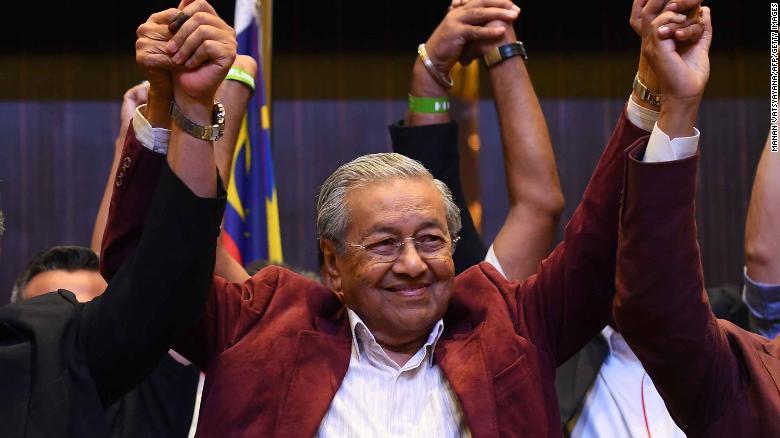In the new Malaysia, signs of an older, uglier politics

Elsewhere in Malaysia’s capital, ubiquitous signs wish people a happy Lunar New Year.These, along with the minarets, churches and temples that dot the city, are small signs of the multicultural fabric of the Malaysian society, a complicated weave of Malay, Chinese, Indian and other identities. The new government — formed by a coalition of parties which forced former Prime Minister Najib Razak from last year, is reflective of that mix. For the first time in the country’s post-independence history, the dominant parties in government are multiethnic ones. The new cabinet also includes numerous Chinese and Indian Malaysians in prominent positions. But whether that will help new Prime Minister Mahathir Mohamad unite the country behind a single Malaysian identity is up for debate.For decades, Malaysia has adopted a policy of institutionalized affirmative action favoring the ethnic Malay majority.And with Najib’s ousted party in opposition for the first time in its history, it stands accused by the opposition of stoking racial tensions among conservative Malays in order to gain ground. There are fears that racial and religious tensions could once again grip the nation. Neither Najib nor his party responded to CNN’s request for comment. ‘);$vidEndSlate.removeClass(‘video__end-slate–inactive’).addClass(‘video__end-slate–active’);}};CNN.autoPlayVideoExist = (CNN.autoPlayVideoExist === true) ? true : false;var configObj = {thumb: ‘none’,video: ‘business/2018/12/17/goldman-sachs-hit-by-1mdb-scandal-qmb.cnn’,width: ‘100%’,height: ‘100%’,section: ‘international’,profile: ‘expansion’,network: ‘cnn’,markupId: ‘body-text_15’,theoplayer: {allowNativeFullscreen: true},adsection: ‘const-article-inpage’,frameWidth: ‘100%’,frameHeight: ‘100%’,posterImageOverride: {“mini”:{“width”:220,”type”:”jpg”,”uri”:”//cdn.cnn.com/cnnnext/dam/assets/190118132724-malaysia-najib-election-01-small-169.jpg”,”height”:124},”xsmall”:{“width”:307,”type”:”jpg”,”uri”:”//cdn.cnn.com/cnnnext/dam/assets/190118132724-malaysia-najib-election-01-medium-plus-169.jpg”,”height”:173},”small”:{“width”:460,”type”:”jpg”,”uri”:”//cdn.cnn.com/cnnnext/dam/assets/190118132724-malaysia-najib-election-01-large-169.jpg”,”height”:259},”medium”:{“width”:780,”type”:”jpg”,”uri”:”//cdn.cnn.com/cnnnext/dam/assets/190118132724-malaysia-najib-election-01-exlarge-169.jpg”,”height”:438},”large”:{“width”:1100,”type”:”jpg”,”uri”:”//cdn.cnn.com/cnnnext/dam/assets/190118132724-malaysia-najib-election-01-super-169.jpg”,”height”:619},”full16x9″:{“width”:1600,”type”:”jpg”,”uri”:”//cdn.cnn.com/cnnnext/dam/assets/190118132724-malaysia-najib-election-01-full-169.jpg”,”height”:900},”mini1x1″:{“width”:120,”type”:”jpg”,”uri”:”//cdn.cnn.com/cnnnext/dam/assets/190118132724-malaysia-najib-election-01-small-11.jpg”,”height”:120}}},autoStartVideo = false,isVideoReplayClicked = false,callbackObj,containerEl,currentVideoCollection = [],currentVideoCollectionId = ”,isLivePlayer = false,mediaMetadataCallbacks,mobilePinnedView = null,moveToNextTimeout,mutePlayerEnabled = false,nextVideoId = ”,nextVideoUrl = ”,turnOnFlashMessaging = false,videoPinner,videoEndSlateImpl;if (CNN.autoPlayVideoExist === false) {autoStartVideo = false;if (autoStartVideo === true) {if (turnOnFlashMessaging === true) {autoStartVideo = false;containerEl = jQuery(document.getElementById(configObj.markupId));CNN.VideoPlayer.showFlashSlate(containerEl);} else {CNN.autoPlayVideoExist = true;}}}configObj.autostart = CNN.Features.enableAutoplayBlock ? false : autoStartVideo;CNN.VideoPlayer.setPlayerProperties(configObj.markupId, autoStartVideo, isLivePlayer, isVideoReplayClicked, mutePlayerEnabled);CNN.VideoPlayer.setFirstVideoInCollection(currentVideoCollection, configObj.markupId);videoEndSlateImpl = new CNN.VideoEndSlate(‘body-text_15’);function findNextVideo(currentVideoId) {var i,vidObj;if (currentVideoId && jQuery.isArray(currentVideoCollection) && currentVideoCollection.length > 0) {for (i = 0; i 0) {videoEndSlateImpl.showEndSlateForContainer();if (mobilePinnedView) {mobilePinnedView.disable();}}}}callbackObj = {onPlayerReady: function (containerId) {var playerInstance,containerClassId = ‘#’ + containerId;CNN.VideoPlayer.handleInitialExpandableVideoState(containerId);CNN.VideoPlayer.handleAdOnCVPVisibilityChange(containerId, CNN.pageVis.isDocumentVisible());if (CNN.Features.enableMobileWebFloatingPlayer &&Modernizr &&(Modernizr.phone || Modernizr.mobile || Modernizr.tablet) &&CNN.VideoPlayer.getLibraryName(containerId) === ‘fave’ &&jQuery(containerClassId).parents(‘.js-pg-rail-tall__head’).length > 0 &&CNN.contentModel.pageType === ‘article’) {playerInstance = FAVE.player.getInstance(containerId);mobilePinnedView = new CNN.MobilePinnedView({element: jQuery(containerClassId),enabled: false,transition: CNN.MobileWebFloatingPlayer.transition,onPin: function () {playerInstance.hideUI();},onUnpin: function () {playerInstance.showUI();},onPlayerClick: function () {if (mobilePinnedView) {playerInstance.enterFullscreen();playerInstance.showUI();}},onDismiss: function() {CNN.Videx.mobile.pinnedPlayer.disable();playerInstance.pause();}});/* Storing pinned view on CNN.Videx.mobile.pinnedPlayer So that all players can see the single pinned player */CNN.Videx = CNN.Videx || {};CNN.Videx.mobile = CNN.Videx.mobile || {};CNN.Videx.mobile.pinnedPlayer = mobilePinnedView;}if (Modernizr && !Modernizr.phone && !Modernizr.mobile && !Modernizr.tablet) {if (jQuery(containerClassId).parents(‘.js-pg-rail-tall__head’).length) {videoPinner = new CNN.VideoPinner(containerClassId);videoPinner.init();} else {CNN.VideoPlayer.hideThumbnail(containerId);}}},onContentEntryLoad: function(containerId, playerId, contentid, isQueue) {CNN.VideoPlayer.showSpinner(containerId);},onContentPause: function (containerId, playerId, videoId, paused) {if (mobilePinnedView) {CNN.VideoPlayer.handleMobilePinnedPlayerStates(containerId, paused);}},onContentMetadata: function (containerId, playerId, metadata, contentId, duration, width, height) {var endSlateLen = jQuery(document.getElementById(containerId)).parent().find(‘.js-video__end-slate’).eq(0).length;CNN.VideoSourceUtils.updateSource(containerId, metadata);if (endSlateLen > 0) {videoEndSlateImpl.fetchAndShowRecommendedVideos(metadata);}},onAdPlay: function (containerId, cvpId, token, mode, id, duration, blockId, adType) {/* Dismissing the pinnedPlayer if another video players plays an Ad */CNN.VideoPlayer.dismissMobilePinnedPlayer(containerId);clearTimeout(moveToNextTimeout);CNN.VideoPlayer.hideSpinner(containerId);if (Modernizr && !Modernizr.phone && !Modernizr.mobile && !Modernizr.tablet) {if (typeof videoPinner !== ‘undefined’ && videoPinner !== null) {videoPinner.setIsPlaying(true);videoPinner.animateDown();}}},onAdPause: function (containerId, playerId, token, mode, id, duration, blockId, adType, instance, isAdPause) {if (mobilePinnedView) {CNN.VideoPlayer.handleMobilePinnedPlayerStates(containerId, isAdPause);}},onTrackingFullscreen: function (containerId, PlayerId, dataObj) {CNN.VideoPlayer.handleFullscreenChange(containerId, dataObj);if (mobilePinnedView &&typeof dataObj === ‘object’ &&FAVE.Utils.os === ‘iOS’ && !dataObj.fullscreen) {jQuery(document).scrollTop(mobilePinnedView.getScrollPosition());playerInstance.hideUI();}},onContentPlay: function (containerId, cvpId, event) {var playerInstance,prevVideoId;if (CNN.companion && typeof CNN.companion.updateCompanionLayout === ‘function’) {CNN.companion.updateCompanionLayout(‘restoreEpicAds’);}clearTimeout(moveToNextTimeout);CNN.VideoPlayer.hideSpinner(containerId);if (Modernizr && !Modernizr.phone && !Modernizr.mobile && !Modernizr.tablet) {if (typeof videoPinner !== ‘undefined’ && videoPinner !== null) {videoPinner.setIsPlaying(true);videoPinner.animateDown();}}},onContentReplayRequest: function (containerId, cvpId, contentId) {if (Modernizr && !Modernizr.phone && !Modernizr.mobile && !Modernizr.tablet) {if (typeof videoPinner !== ‘undefined’ && videoPinner !== null) {videoPinner.setIsPlaying(true);var $endSlate = jQuery(document.getElementById(containerId)).parent().find(‘.js-video__end-slate’).eq(0);if ($endSlate.length > 0) {$endSlate.removeClass(‘video__end-slate–active’).addClass(‘video__end-slate–inactive’);}}}},onContentBegin: function (containerId, cvpId, contentId) {if (mobilePinnedView) {mobilePinnedView.enable();}/* Dismissing the pinnedPlayer if another video players plays a video. */CNN.VideoPlayer.dismissMobilePinnedPlayer(containerId);CNN.VideoPlayer.mutePlayer(containerId);if (CNN.companion && typeof CNN.companion.updateCompanionLayout === ‘function’) {CNN.companion.updateCompanionLayout(‘removeEpicAds’);}CNN.VideoPlayer.hideSpinner(containerId);clearTimeout(moveToNextTimeout);CNN.VideoSourceUtils.clearSource(containerId);jQuery(document).triggerVideoContentStarted();},onContentComplete: function (containerId, cvpId, contentId) {if (CNN.companion && typeof CNN.companion.updateCompanionLayout === ‘function’) {CNN.companion.updateCompanionLayout(‘restoreFreewheel’);}navigateToNextVideo(contentId, containerId);},onContentEnd: function (containerId, cvpId, contentId) {if (Modernizr && !Modernizr.phone && !Modernizr.mobile && !Modernizr.tablet) {if (typeof videoPinner !== ‘undefined’ && videoPinner !== null) {videoPinner.setIsPlaying(false);}}},onCVPVisibilityChange: function (containerId, cvpId, visible) {CNN.VideoPlayer.handleAdOnCVPVisibilityChange(containerId, visible);}};if (typeof configObj.context !== ‘string’ || configObj.context.length 0) {configObj.adsection = window.ssid;}CNN.autoPlayVideoExist = (CNN.autoPlayVideoExist === true) ? true : false;CNN.VideoPlayer.getLibrary(configObj, callbackObj, isLivePlayer);});CNN.INJECTOR.scriptComplete(‘videodemanddust’);Diverse nation In Malaysia, over 60% of the country’s 32 million population belong to the Bumiputera — a group known as “sons of the soil,” which includes ethnic Malays, and natives of Sarawak and Sabah in Borneo. At 21%, Chinese Malaysians make up the country’s next largest ethnic group, followed by Indian Malaysians at 6%.That diversity is largely due to Malaysia’s period as a British colony, during which the colonial rulers imported Indian and Chinese laborers, many of whom thrived economically.Some perceived this immigrant success to have come at the expense of indigenous populations, and the Barisan Nasional (BN) coalition which led the country until 2018, moved to uplift the Bumiputera.Possibly the best-known and widest reaching instrument of this goal was the New Economic Policy. Introduced in 1971, it gave Malays perks including cheaper housing, business loans and generous quotas to enter public universities. The aim was to get that community to control at least 30% of the national economy within 20 years. While the policy has since been revised, Bumiputera continue to receive most of the same privileges.Today, the Malaysian constitution still promises to “safeguard the special position of the Malays and natives of any of the states of Sabah and Sarawak.” The document considers all Malay to be Muslims, and multiple governments have pushed for policies which benefit Islam over Malaysia’s two main minority faiths, Buddhism and Christianity. Rise of conservatismFor years, the United Malays National Organization (UNMO), which was led by Najib, dominated the ruling coalition, and implemented pro-Malay policies.”UMNO under Najib (ran) a very obvious Malay-first campaign,” said Ross Tapsell, director of the Malaysia Institute at the Australian National University. “Racialized politics increased under the Najib-UMNO administration.” Since losing power last year, UMNO has been accused of doubling down on racial and religious issues, and has allied itself with the conservative Malaysian Islamic Party (PAS), a former rival. At a by-election last month in Cameron Highlands, an ethnically diverse seat in central Malaysia, the UMNO-BN candidate swept to victory, in part thanks to that new alliance. In a statement following the vote, UMNO vice-president Mohamed Khaled Nordin said the victory “will give rise to a large and important Malay Muslim wave that could silence” the ruling coalition. He claimed that the “the voice of the Malays” in Mahathir ‘s government was “very small,” according to local media. While the losing parties blamed their loss in Cameron Highlands on UMNO and the PAS stoking racial tensions, Tapsell, of the Malaysia Institute at the Australian National University, was skeptical. He said the opponent had run “a pretty shoddy campaign,” while “UMNO ran a better campaign and had a better candidate.” Representatives for UMNO and PAS did not respond to a request for comment. Najib is seen as one of the drivers of the new alliance with PAS. The former Prime Minister has also taken to frequently sniping at the government on Facebook, as he courts rural Malay voters under the slogan “Malu Apa Bossku” (“Why does my boss have to be ashamed?”). Najib has denied allegations of corruption over the 1MDB scandal, and his suppporters have argued the prosecution’s case against him is politically motivated and he has no reason to be ashamed.There are signs this approach is working. A recent survey found 54.4% of Malay respondents did not believe the new government was serious about upholding the “Malay agenda.” ‘We are worried’In a food market in Kuala Lumpur’s Petaling Jaya neighborhood, concern over a backlash against Chinese Malaysians was on Albert Chan’s mind while he celebrated the Lunar New Year with an ethnically diverse table of friends.”(UMNO and PAS) bring up Malay, Malay … they’re already talking about racial issues,” he said. “We are worried about that.”Chan’s friend Dave Singh said new policies were needed favoring all Malaysians after decades of pro-Bumiputera affirmative action.”The rest of us we were not taken care of, especially the Chinese and the Indians,” he said of the previous government. “Chinese have to do business, business, Indians have to slog and slog. We were not being helped.” But according to lawmaker Tony Pua, of the Democratic Action Party (DAP), which forms part of Mahathir’s coalition, the racialized campaign being waged in Cameron Heights by the conservatives is an act of desperation.”This is their only strategy,” he said. “They have no strategy except to prey on the community’s racial and religious fears.”Pua said UMNO was clutching at straws, after the financial scandal which brought down the former prime minister left the party’s reputation in tatters, but conceded it wasn’t good for public harmony.”It strikes concern and fear,” he admitted. “It’s unsettling, it doesn’t generate confidence.” ‘Malay dominance is being encroached on’In Kampong Bharu, a traditional Malay village in the heart of Kuala Lumpur, other Malaysians had opposite concerns.Inside a PAS-run kindergarten, manager Azim Awi said he was wary that the new government would sideline Malay Muslims. Pua’s DAP party, for example, has long faced accusations of being pro-Chinese and anti-Malay. “The perception (among) the Malays is that the Malays’ dominance in politics is being encroached by other races,” Azim said.One key source of tension for Mahathir’s government is likely to focus on education.Non-Muslim Malaysians have long complained that public schools have become increasingly Islamized, and there has been a shift — particularly among middle-class parents — towards private schooling, according to academic James Chin. “Education is usually front and center of the larger issue around Bumiputera policies and the special rights of the Malays,” said Tapsell, noting that this was particularly the case at university level, where ethnic Malays have traditionally received favorable treatment. The social effect of separate schooling has been that “Malaysians’ circles of friends tend to be ethnically homogenous,” according to a review of polling data conducted by Lee Hwok Aun, of Singapore’s ISEAS-Yusof Ishak Institute.In Kampong Bharu, Azim happily acknowledged one purpose of his kindergarten was to indoctrinate a new generation of PAS voters, raising them in accordance with the party’s strict interpretation of Islam. Abel Chong, a young Chinese Malaysian who took part in anti-Najib protests, said he believed that a push towards greater secularism was important for a unified Malaysia.”The first thing we should do is really eradicate the idea of having religion with politics,” he said. “Right now, the idea of them enforcing Islam is really bad. If people drink alcohol or eat pork that’s up to them, they shouldn’t involve that in politics, we’re not a Muslim country. That’s the only thing that’s holding us back.” In the past, non Muslim Malaysians have been arrested for eating or smoking in public during the holy month of Ramadan, and many restaurants in the capital still feature prominent “no pork” signs. Charles Santiago, a DAP lawmaker, said the PAS-UMNO alliance was a calculated move to divide and conquer the country.”It’s no longer about religion, it’s about politics and winning the hearts and minds of Malays,” he said. “The more you poison the hearts of Malays the better it is for them.”Journalist Hadi Azmi contributed reporting.







